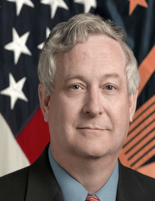Symposium Home Agenda Abstracts and Bios
May 23, 2018 at 17:00
Chair: John Dvorak
CIO, Salient CRGT
Chair: John Russack
USG
Leslie J. (“Jake”) Schaffner, Jr.

Mr. Schaffner, a native of San Diego, CA, graduated from the University of Texas, Austin in 1974 via the NROTC program, earning a B.A. in Geography. He received a regular commission and served 27 years as a Surface Warfare Officer. His tours included positions as a ship’s communication officer, navigator on FGS Z-4 (foreign exchange, German Navy), Chief Engineer (twice), Executive Officer, and ultimately in command of USS Mahlon S. Tisdale (FFG-27).
He is a graduate of the Naval Postgraduate School, where he earned a M.S.c. in Systems Technologies (Space Systems) in 1986. His thesis, “Naval Strike Applications of the Transatmospheric Vehicle”; focused on applications of hypersonic propulsion and exotic sensor technologies to maritime warfighting. He served on the Chief of Naval Operations staff in the Tactical Exploitation of National Capabilities (TENCAP) branch where he was project director for research efforts that applied National Reconnaissance Office (NRO)-developed technologies to the support of Navy over-the-horizon-targeting (OTHT) initiatives.
Following command, Mr. Schaffner served on the Joint Staff in the Directorate of Operations (J3) Special Technical Operations (STO) division. He began as a project officer, but advanced steadily in responsibility, eventually leading the Policy and Capabilities Division. During this time he had substantial roles in all significant national and joint information warfare (IW) and information operations (IO) planning and exercise efforts, contributing strongly to the division’s eventual conversion into the J-39, Information Operations Directorate, shortly before his departure.
Mr. Schaffner’s final active duty assignment was on the Intelligence Community (IC) Management Staff (CMS) where he served as the Director of Information Operations (IO) Policy. Based on his work on the Joint Staff and CMS, over the past 22 years Mr. Schaffner has been either a principal or key contributing author to significant national-level policy documents related to infrastructure protection, continuity of operations, cyber, IO, and STO.
Upon retirement from active duty, he joined SCITOR Corporation as a Senior Strategic Analyst supporting a classified client with IO policy analysis. In 2002, he joined Booz Allen Hamilton as a Senior Associate where he worked as an expert in IO policy, strategic influence, the application of advanced technologies to IO, and the impact of advanced technologies on defense policy. His primary clients were in the Department of Defense and he eventually built a practice employing nearly 30 specialists.
Mr. Schaffner left Booz Allen Hamilton in April of 2009 to rejoin the Department of Defense. Initially he served as a senior scientific advisor in the office of the Director, Information Operations and Strategic Studies (DIOSS) within the staff of the Under Secretary of Defense, Intelligence (USDI). In 2010 he moved to the office of the Director of Battlespace Awareness and Program Assessment (BA&PA) where he served as the Senior Advisor for Strategic Assessments. With the reorganization of the USDI staff, he was transferred to the office of the Director for Clandestine Operations, Global Access, and Mission Integration to serve as the leader for joint DoD and Intelligence Community hard target innovation efforts. After six years in that role, Mr. Schaffner now serves as the Senior Advisor for Technical and Mission Convergence in the office of the Director for Signals Intelligence (SIGINT), Electronic Warfare (EW), and Cyber.
Mr. Schaffner’s diverse portfolio of responsibilities has included serving on the source selection panel for the National Cyber Range, being a member of the team drafting DoD strategic cyber policy, drafting concepts of operations for advanced IO technical capabilities, wargaming cyber concepts with allies, serving as the senior OSD intelligence official responsible for modeling and simulation; assessing potential policy impacts of emerging technologies; serving as an executive secretary to a Defense Science Board Summer Study intelligence panel; and serving as the leader of interagency teams addressing challenges in the application of advanced technology to some of the Department’s most difficult technical intelligence requirements.
Jake resides in Alexandria, VA with his wife, Kenwyn, the Principal of Jamestown Elementary School. They have two grown children: Daniel, a security engineering manager with Amazon and Diana, a Counsel with Akin, Gump, Strauss, Hauer, & Feld in San Francisco
Admiral William O. Studeman, USN (Ret.)

Bill Studeman retired from Northrop Grumman Corporation (NGC) in 2005 as Vice President and Deputy General Manager of the Mission Systems Sector focused on System Integration/ System Engineering of large complex systems. In this position, he focused on strategies, programs, business development, marketing, as well as corporate cross-Sector integration, and on managing Defense and Intelligence technology partnerships and concepts related to Net Centricity/Cyber matters, ISR, IO/IW, Aerospace and Advanced Command Environments. He served in this position for almost 10 years, and continued until recently as an Independent Consultant to NGC and other companies, as well as to the government. Most of his semi-retired time today is spent on Intelligence, Cyber/Information Operations and Defense/Naval Strategy matters.
Admiral Studeman was born in Brownsville, Texas, in 1940, and was raised in Coral Gables, Florida. He holds a BA in History from the University of the South, Sewanee, Tennessee, and an MA in Public and International Affairs from George Washington University and several honorary doctorates. He is a Distinguished Graduate of both the Naval and National War Colleges. As a restricted line Naval Intelligence Officer, Admiral Studeman served in the Pacific, Atlantic and Mediterranean. His flag tours included: OPNAV Director of Long Range Navy Planning, Director of Naval Intelligence, Director, National Security Agency, and Deputy Director of Central Intelligence and the CIA (with two extended periods as Acting Director of Central Intelligence and CIA). As DDCI, he served in both the Bush I and Clinton Administrations under DCI’s Bob Gates, Jim Woolsey and John Deutch. Admiral Studeman retired from the Navy in 1995, after 34 years of service.
Admiral Studeman has served on Corporate and University boards, and continues to serve on government and corporate/lab advisory boards. Admiral Studeman also lectures at Universities on Intelligence and Cyber matters, and appears in periodic forums/discussions related to Cyber and Intelligence. He was a Commissioner on the Presidential Commission on WMD, and is currently serving as a Congressional Emeritus member of the Public Interest Declassification Board (PIDB) of the National Archives where he chairs their Technology Working Group. He is a past member of the Defense Science Board, the DNI Senior Advisory Group, the now defunct DNI Intelligence Community Strategic Studies Group (ICSSG), the NGA Independent Advisory Group, NRO Gold Team, the National Intelligence University Board of Visitors, the recent Nuclear Comprehensive Review, and the JIEDDO Senior Advisory Council, and the DNI Advisory Board. He recently chaired the Secretary of the Navy’s Advisory Panel (SNAP), the Sandia National Lab Intelligence/Strategy Advisory Group, and was also a Draper Lab Emeritus Corporation Member, member of a Task Force supporting Director DIA on the standup of the DIA DDO/Defense Clandestine Service, member of the Intelligence and National Security Alliance
Riley Repko

Mr. Riley Repko is the Strategic Adviser to the Air Force Secretary and Chief of Staff on innovation and modernization issues to existing and future requirements serving at Headquarters U.S. Air Force, Washington, D.C. This position enables Air Force management, through operational expertise and industry access, the awareness necessary to assist in the development of proper strategic planning, communications and execution of existing programs. To also provide new organizational strategies; transformational planning, new ideas and execution paramount to supporting the SecAF’s and the CSAF’s priorities in Air, Space and Cyberspace for the senior-most Air Force leaders. He serves as a functional expert and special adviser collaborating with Defense Department organizations and industry on how best to build and complement the Air Force’s requirements while integrating the awareness to these capabilities with current operational forces within the Air Force by establishing and maintaining essential relationships, specific lines of communications and critical processes to ensure continued success across the entire USAF operational enterprise. Mr. Repko is a highly qualified expert who will serve in this assignment for three years.
Mr. Repko entered the Air Force’s Officer training School in 1979, after graduating from St. Bonaventure University, N.Y. While on active duty, he served in staff assignments as an electronic warfare systems engineer and major command aide-de-camp. Mr. Repko separated from active duty in 1984 and continued his military career in the Air Force Reserve for the next 22 years. As an individual mobilization augmentee on the Air Staff, he held assignments in space operations, modeling and simulation wargame/exercise support and budgeting and programming. He then held senior Reserve positions as a mobilization assistant both at Air Force Space Command, on the U.S. Strategic Command staff and at Headquarters Air Force. In March 2004, he deployed to Balad, Iraq as the 332nd Air Expeditionary Wing Vice Commander and Director of Staff.
As a civilian, Mr. Repko spent 30 years as a technology industry executive specializing in software, cybersecurity solutions, product sales and strategic business development both in the U.S. and in the Asia-Pacific region.